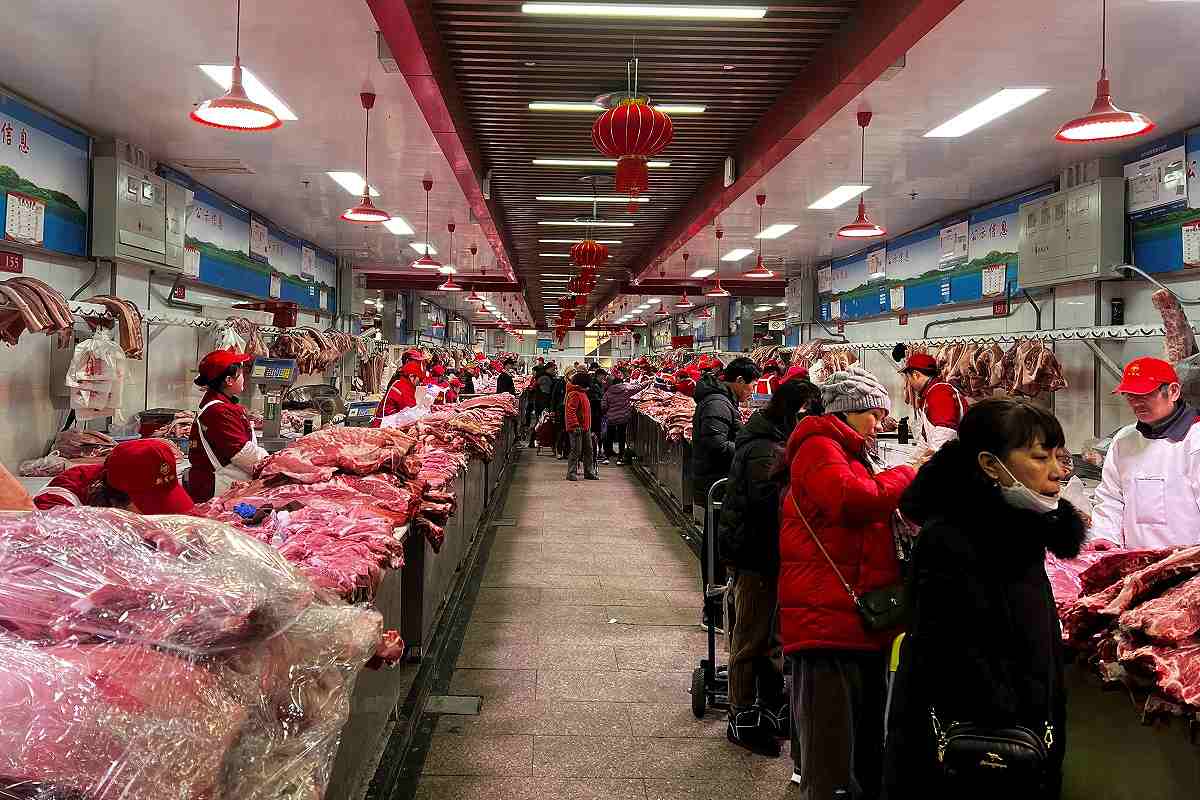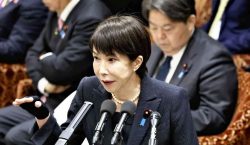
Pork sellers attend to customers at the Xinfadi wholesale market in Beijing, China February 2, 2024.
16:41 JST, March 9, 2024
BEIJING (Reuters) – China’s consumer prices rose for the first time in six months due to spending linked to the Lunar New Year, offering some reprieve for the world’s second-biggest economy grappling with weak consumer sentiment, while factory-gate prices fell again.
The consumer price index (CPI) climbed 0.7% year-on-year in February, data from the National Bureau of Statistics (NBS) showed on Saturday, beating the 0.3% gain forecast by economists in a Reuters poll.
The year-on-year growth in consumer prices was also the highest in 11 months, buoyed by gains in some key foodstuffs such as pork and fresh vegetables, as well as travel amid a seasonal rush around Lunar New Year in February, according to the NBS data.
The bounce into positive territory contrasted with the 0.8% fall in January, the steepest drop in over 14 years, due to a higher statistical base in January 2023 as the Lunar New Year arrived earlier that month and boosted spending.
While other recent indicators, such as much stronger-than-expected trade figures this week, have suggested improvement in some parts of the economy, analysts warn that a full-throttled recovery is not yet in the cards.
“It is too early to conclude that deflation in China is over,” said Zhiwei Zhang, president and chief economist at Pinpoint Asset Management.
“Domestic demand is still quite weak. Property sales of new apartments have not stabilized yet.”
In February this year, CPI rose 1.0% month-on-month, outpacing the 0.3% uptick in January and the 0.7% growth forecast by economists.
But the producer price index (PPI) fell 2.7% from a year earlier in February versus a 2.5% drop the previous month. That was faster than a 2.5% decline forecast in the Reuters poll. Producer prices have declined for more than 1-1/2 years.
The risk of deflation due to continued weak demand remains one of the main drags on China’s overall growth.
In January-February, CPI was unchanged from a year earlier, with food prices down 3.4% and non-food prices 0.9% lower.
China has been grappling with sub-par growth over the past year amid an entrenched debt crisis among the country’s property developers that had crushed home-buying sentiment and rocked what was once a mighty pillar of the economy.
Weak international trade flows, declining domestic investment, and high local government debt further sapped economic growth. Policymakers have pledged to roll out new measures, promising to unleash “new productive forces.”
The head of China’s central bank said on Wednesday there was room to cut the amount of cash that commercial banks set aside as reserves, following 50 basis points of cuts in banks’ reserve ratio requirement (RRR) in January, the biggest in two years.
Premier Li Qiang on Tuesday announced an ambitious economic growth target of around 5%, although economists said the goal would be harder to reach as a post-COVID recovery loses steam. The International Monetary Fund has predicted China’s growth to ease to 4.6% from 5.2% last year.
Li also set a 2024 inflation target of 3%, in line with goals set since 2015. Consumer prices rose 0.2% last year, missing the government’s target.
“We only expect a modest recovery in CPI and PPI inflation despite the CPI inflation target of 3%, and a deeper property downturn may pose greater deflationary risk,” said economists at UBS in a research note this week.
Top Articles in News Services
-

Survey Shows False Election Info Perceived as True
-

Hong Kong Ex-Publisher Jimmy Lai’s Sentence Raises International Outcry as China Defends It
-

Japan’s Nikkei Stock Average Touches 58,000 as Yen, Jgbs Rally on Election Fallout (UPDATE 1)
-

Japan’s Nikkei Stock Average Falls as US-Iran Tensions Unsettle Investors (UPDATE 1)
-

Japan’s Nikkei Stock Average Rises on Tech Rally and Takaichi’s Spending Hopes (UPDATE 1)
JN ACCESS RANKING
-

Producer Behind Pop Group XG Arrested for Cocaine Possession
-

Japan PM Takaichi’s Cabinet Resigns en Masse
-

Man Infected with Measles Reportedly Dined at Restaurant in Tokyo Station
-

Israeli Ambassador to Japan Speaks about Japan’s Role in the Reconstruction of Gaza
-

Videos Plagiarized, Reposted with False Subtitles Claiming ‘Ryukyu Belongs to China’; Anti-China False Information Also Posted in Japan






















